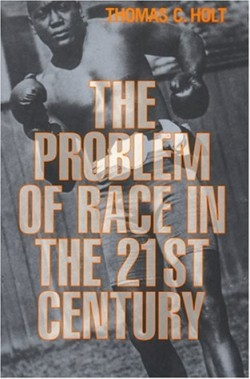The Problem of Race in the Twenty-First Century
Holt takes on a huge task in a slim volume, attempting to place the conundrum of race in the context of a new century. Starting with the natural jumping-off point of W. E. B. DuBois’ prediction (1903) that the problem of the twentieth century will be the problem of the color line, Holt examines how that issue, yet unsolved, must be redefined at the dawn of a new century.
Hold first describes the dual-yet-dichotomous nature of color relations, how certain qualities are valued by the oppressor in one situation, then reviled by the same observer in the context of changing times. For example, slave women were once seen as producers. They gave birth to new slaves for societies which, for whatever reason, no longer had ready access to new levies. Yet, the fecundity of the descendants of slaves is disparaged in a postindustrial society that no longer needs the fruit of their wombs.
Taking a page from Michael Foucault, he describes such phenomena as “Biopower,” the capacity of a modern state to control not only the allegiance of its citizens and subjects (a major distinction) but also their bodies. Behind the objective analysis and scholarly tone of Holt’s work, then, lurks a disquieting theme: That of the former victims of slavery and colonialism as a surplus population.
If Holt’s insights, however, are taken to their logical conclusion, does that mean a constant eradication, through a sort of gradual, velvet genocide will develop in some nations and brute murder in others, of the so-called surplus populations? Not exactly, he posits.
The solution is to be found in the collateral effect of slaver-slave, colonialist-colonizer relations. The former slaves and the former colonized have learned the weapons of the slavers and colonialists. So in nations such as South Africa, the world has seen the outsiders become the insiders, thus slowing, if not reversing, the tide of traditional oppression.
The new question of the color line, then, is not the level of oppression, but rather the degree to which the formerly oppressed will repeat what was taught them, or reject the revenge motive. It’s clear where Holt sees society going. “You must refuse to be racialized or to racialize others,” he writes at the book’s end in a valedictory to his daughter. “But at the same time, you must live as though the world were otherwise.”
Reviewed by
James Abraham
Disclosure: This article is not an endorsement, but a review. The publisher of this book provided free copies of the book to have their book reviewed by a professional reviewer. No fee was paid by the publisher for this review. Foreword Reviews only recommends books that we love. Foreword Magazine, Inc. is disclosing this in accordance with the Federal Trade Commission’s 16 CFR, Part 255.

